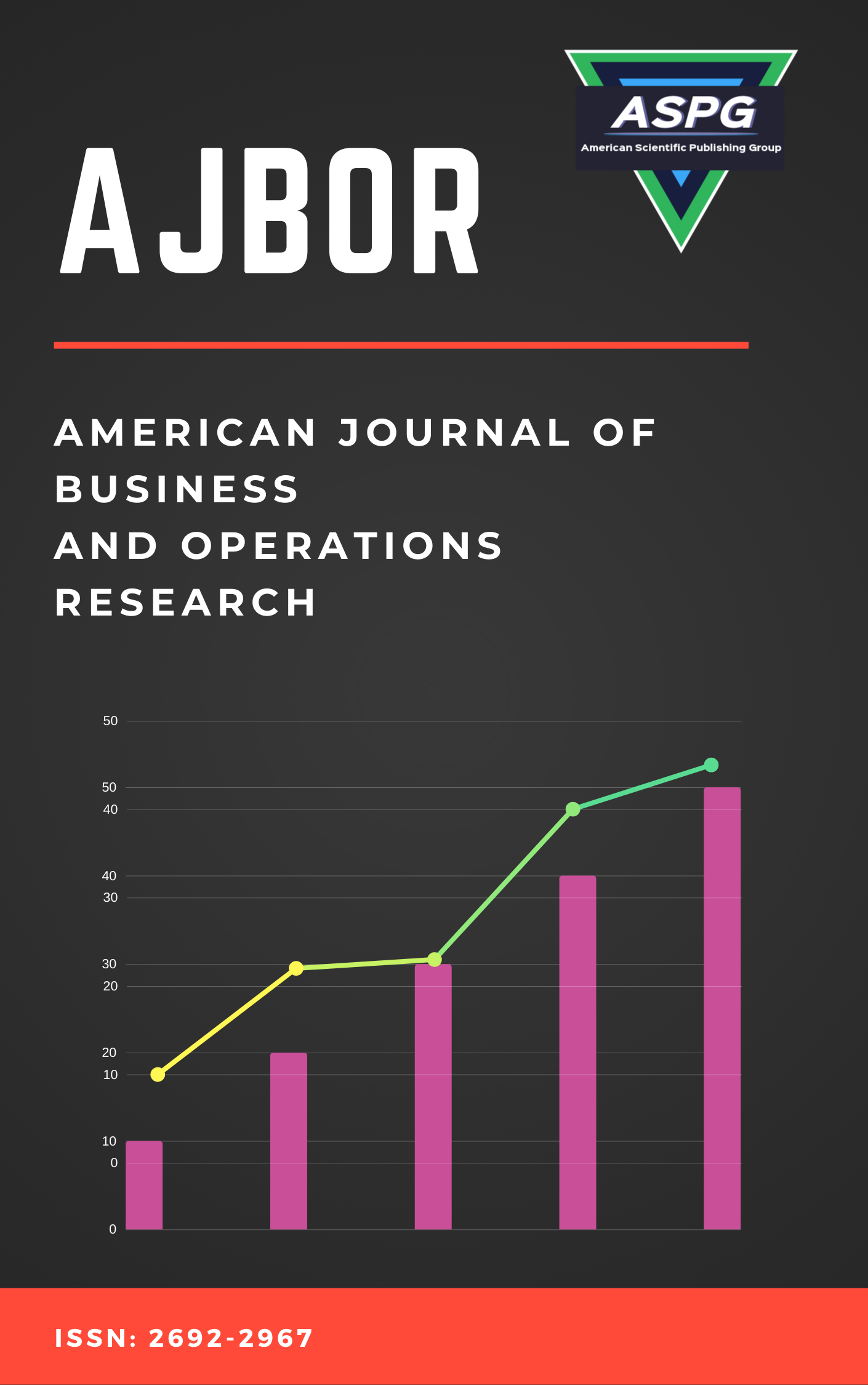

Volume 0 , Issue 1 , PP: 66-74, 2019 | Cite this article as | XML | Html | PDF | Full Length Article
Ahmed M. Ali 1 * , Ahmed Abdelhafeez Ibrahim 2
Stakeholders may gauge a company's financial well-being, profitability, and efficiency via a financial performance review. An outline of the main points of evaluating financial performance is given in this abstract. Revenue growth, profitability, liquidity, cash flow, return on investment, debt management, asset efficiency, market value, return on equity, and comparative analysis against industry peers are all the evaluation's financial criteria and metrics. The market value, debt levels, liquidity, profitability, cash flow management, revenue-generating capabilities, and the firm's financial condition may be better understood by looking at these metrics. We proposed a methodology to evaluate the financial performance in the competitive global economy. We gather the criteria to be analyzed. So, we used the concept of multi-criteria decision-making (MCDM) to deal with various and conflicting criteria. We compute the weights of the criteria by the mean value. Then, we used the criteria weights as input into the MCDM method. We used the VIKOR method to rank the various companies in this study. We collected ten criteria and 20 companies to be organized. We conducted the sensitivity analysis in two parts and changed the weights of criteria under ten different cases. In the second case, we change the parameter in the VIKOR method with a value between 0.1 and 1. The results of the two cases show the results are stable and the proposed model performs well.
Market Analysis , Global Economy , Decision Support , MCDM , VIKOR Method , Financial Performance.
[1] A. Galant and S. Cadez, “Corporate social responsibility and financial performance relationship: A review of measurement approaches,” Economic research-Ekonomska istraživanja, vol. 30, no. 1, pp. 676–693, 2017.
[2] A. Alshehhi, H. Nobanee, and N. Khare, “The impact of sustainability practices on corporate financial performance: Literature trends and future research potential,” Sustainability, vol. 10, no. 2, p. 494, 2018.
[3] Q. Gu, T. Jitpaipoon, and J. Yang, “The impact of information integration on financial performance: A knowledge-based view,” International Journal of Production Economics, vol. 191, pp. 221–232, 2017.
[4] P. Velte, “Does ESG performance have an impact on financial performance? Evidence from Germany,” Journal of Global Responsibility, vol. 8, no. 2, pp. 169–178, 2017.
[5] Z. Wang and J. Sarkis, “Corporate social responsibility governance, outcomes, and financial performance,” Journal of cleaner production, vol. 162, pp. 1607–1616, 2017.
[6] M. Rodriguez-Fernandez, “Social responsibility and financial performance: The role of good corporate governance,” BRQ Business Research Quarterly, vol. 19, no. 2, pp. 137–151, 2016.
[7] G. Friede, T. Busch, and A. Bassen, “ESG and financial performance: aggregated evidence from more than 2000 empirical studies,” Journal of sustainable finance & investment, vol. 5, no. 4, pp. 210–233, 2015.
[8] Y. Qiu, A. Shaukat, and R. Tharyan, “Environmental and social disclosures: Link with corporate financial performance,” The British Accounting Review, vol. 48, no. 1, pp. 102–116, 2016.
[9] C. Post and K. Byron, “Women on boards and firm financial performance: A meta-analysis,” Academy of management Journal, vol. 58, no. 5, pp. 1546–1571, 2015.
[10] J. Nollet, G. Filis, and E. Mitrokostas, “Corporate social responsibility and financial performance: A non-linear and disaggregated approach,” Economic Modelling, vol. 52, pp. 400–407, 2016.
[11] L. Wang, H. Zhang, J. Wang, and L. Li, “Picture fuzzy normalized projection-based VIKOR method for the risk evaluation of construction project,” Applied Soft Computing, vol. 64, pp. 216–226, 2018.
[12] Y. J. B. Parrangan et al., “The implementation of VIKOR method to improve the effectiveness of Sidi learning graduation,” Int. J. Eng. Technol, vol. 7, no. 3.4, 2018.
[13] K. Shen and J. Wang, “Z-VIKOR method based on a new comprehensive weighted distance measure of Z-number and its application,” IEEE Transactions on Fuzzy Systems, vol. 26, no. 6, pp. 3232–3245, 2018.
[14] Y. Wu, K. Chen, B. Zeng, H. Xu, and Y. Yang, “Supplier selection in nuclear power industry with extended VIKOR method under linguistic information,” Applied Soft Computing, vol. 48, pp. 444–457, 2016.
[15] V. Tiwari, P. K. Jain, and P. Tandon, “Product design concept evaluation using rough sets and VIKOR method,” Advanced Engineering Informatics, vol. 30, no. 1, pp. 16–25, 2016.
[16] D. Siregar et al., “Multi-attribute decision making with VIKOR method for any purpose decision,” in Journal of Physics: Conference Series, IOP Publishing, 2018, p. 12034.
[17] P. Chatterjee and S. Chakraborty, “A comparative analysis of VIKOR method and its variants,” Decision Science Letters, vol. 5, no. 4, pp. 469–486, 2016.
[18] M. Kumar and C. Samuel, “Selection of best renewable energy source by using VIKOR method,” Technology and Economics of Smart Grids and Sustainable Energy, vol. 2, pp. 1–10, 2017.
[19] H.-C. Liu, J.-X. You, X.-Y. You, and M.-M. Shan, “A novel approach for failure mode and effects analysis using combination weighting and fuzzy VIKOR method,” Applied soft computing, vol. 28, pp. 579–588, 2015.
[20] M. Tavana, R. K. Mavi, F. J. Santos-Arteaga, and E. R. Doust, “An extended VIKOR method using stochastic data and subjective judgments,” Computers & Industrial Engineering, vol. 97, pp. 240–247, 2016.